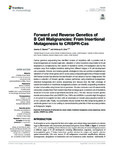Forward and Reverse Genetics of B Cell Malignancies: From Insertional Mutagenesis to CRISPR-Cas
| dc.contributor.author | Dawes, JC | |
| dc.contributor.author | Uren, AG | |
| dc.date.accessioned | 2022-05-12T14:23:48Z | |
| dc.date.issued | 2021-08-13 | |
| dc.identifier.issn | 1664-3224 | |
| dc.identifier.issn | 1664-3224 | |
| dc.identifier.other | 670280 | |
| dc.identifier.uri | http://hdl.handle.net/10026.1/19218 | |
| dc.description.abstract |
Cancer genome sequencing has identified dozens of mutations with a putative role in lymphomagenesis and leukemogenesis. Validation of driver mutations responsible for B cell neoplasms is complicated by the volume of mutations worthy of investigation and by the complex ways that multiple mutations arising from different stages of B cell development can cooperate. Forward and reverse genetic strategies in mice can provide complementary validation of human driver genes and in some cases comparative genomics of these models with human tumors has directed the identification of new drivers in human malignancies. We review a collection of forward genetic screens performed using insertional mutagenesis, chemical mutagenesis and exome sequencing and discuss how the high coverage of subclonal mutations in insertional mutagenesis screens can identify cooperating mutations at rates not possible using human tumor genomes. We also compare a set of independently conducted screens from Pax5 mutant mice that converge upon a common set of mutations observed in human acute lymphoblastic leukemia (ALL). We also discuss reverse genetic models and screens that use CRISPR-Cas, ORFs and shRNAs to provide high throughput in vivo proof of oncogenic function, with an emphasis on models using adoptive transfer of ex vivo cultured cells. Finally, we summarize mouse models that offer temporal regulation of candidate genes in an in vivo setting to demonstrate the potential of their encoded proteins as therapeutic targets. | |
| dc.format.extent | 670280- | |
| dc.format.medium | Electronic-eCollection | |
| dc.language | eng | |
| dc.language.iso | eng | |
| dc.publisher | Frontiers Media SA | |
| dc.subject | B cell leukemia | |
| dc.subject | B cell lymphoma | |
| dc.subject | mouse models | |
| dc.subject | insertional mutagenesis | |
| dc.subject | exome sequencing | |
| dc.subject | reverse genetics | |
| dc.subject | CRISPR-Cas | |
| dc.subject | shRNA<bold | |
| dc.subject | > | |
| dc.title | Forward and Reverse Genetics of B Cell Malignancies: From Insertional Mutagenesis to CRISPR-Cas | |
| dc.type | journal-article | |
| dc.type | Review | |
| plymouth.author-url | https://www.ncbi.nlm.nih.gov/pubmed/34484175 | |
| plymouth.volume | 12 | |
| plymouth.publication-status | Published online | |
| plymouth.journal | Frontiers in Immunology | |
| dc.identifier.doi | 10.3389/fimmu.2021.670280 | |
| plymouth.organisational-group | /Plymouth | |
| plymouth.organisational-group | /Plymouth/Faculty of Health | |
| plymouth.organisational-group | /Plymouth/Users by role | |
| dc.publisher.place | Switzerland | |
| dcterms.dateAccepted | 2021-07-09 | |
| dc.rights.embargodate | 2022-12-16 | |
| dc.identifier.eissn | 1664-3224 | |
| dc.rights.embargoperiod | Not known | |
| rioxxterms.versionofrecord | 10.3389/fimmu.2021.670280 | |
| rioxxterms.licenseref.uri | http://www.rioxx.net/licenses/all-rights-reserved | |
| rioxxterms.licenseref.startdate | 2021 | |
| rioxxterms.type | Journal Article/Review |


